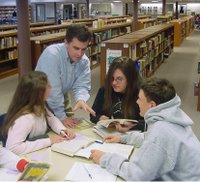Responsible blogging
Hello English 10 students...
I have read and reviewed your postings from Monday's assignment. There were many great ideas brought forth from your blog postings, and I have compiled them here as part of our new classroom policy on blogging. Several of you referred to the blog policy of Mr. Hunt in Colorado, which we used as a guideline in drafting ours.
From reading your postings, it seems like we agree on the following general guidelines:
- No personal information (last names, contact information, pictures, etc...) should be included anywhere in your blog. This parallels what the school district's policy is regarding these matters. Even e-mail addresses should not be made public on the blog.
- Information and ideas on the blog should only be on school-related topics. More specifically, your blogs should deal with ideas related to the novels you are reading. These blogs are not places to socialize or meet other people.
- All students - and teachers - should be careful and conscious about what they write because their blog exists on the internet, which is a public place. Only post what you want the world to know. This means that all writing should be school-appropriate, respectful, and free from harmful, hateful, or offensive language.
- Students and teachers have the right to delete any comments posted by someone else on their blogs that they do not feel comfortable with. Students can also restrict the settings on their blog to prevent comments if they feel it is necessary.
In addition to the policies, many of you posted some valuable ideas and thoughts about our work blogging. Here are some excerpts that I thought might be of interest:
Tori mentioned a concern that is relevant to a lot of things when it comes to technology, whether it's computers or video games. She writes, "Another danger that was not discussed is the fact that some teens get so involved with their pages, that they spend all their time inside on the computer."
John wrote about how there are dangers in a lot of activities, but that doesn't mean we should ban them, only that we need to be safe about it. He writes, "I like in the 2ND text, how they say bad thing happen [in other activities for example]. "You could get hurt in a sport, whats the difference with the online thing" the teacher explains. Some good rules would be to consistently check your blog, and if any comments come up that you don't know who they are, report it to a teacher right away."Shane writes, "Also you want to make sure that anything you write in a blog or link to your blog is something that you understand and want to be associated with."
Morgan writes, "On a website I recently read, it said that you should be sure that anything you write you are proud of, it can and will come back to get you if you don't. I found this very interesting, but right. In the future, if you were to be looking for a job, it might be possible for an employer to discover some immature things posted when you were younger. I'm sure that nobody would want this to happen, but it will if unnecessary things are written."
And finally, George writes, "One shouldn't try to make friends as if it were myspace, attracting the wrong type of people. The key to safe blogging is to use your own good judgement in what you say or do."
I agree. Thank you for your efforts and in class, and please let me know if you have any comments, concerns, or suggestions.



1 comment:
I had a chance to read several of your students' posts on safety. Please thank them for their thoughtfulness. Good luck to y'all as you begin to blog!
Post a Comment